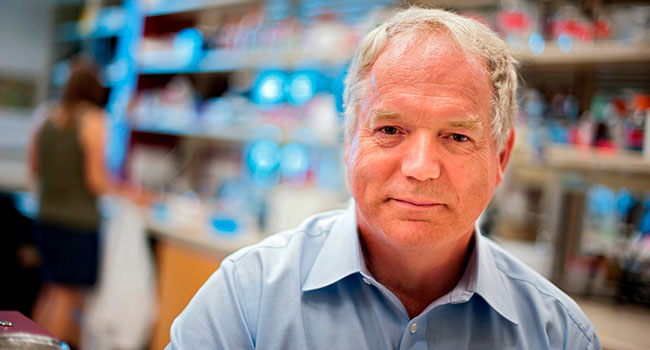Michael Houghton was awarded the 2020 Nobel Prize in Physiology or Medicine today in recognition of his discovery of the hepatitis C (HCV) virus.
His discovery with colleagues Qui-Lim Choo and George Kuo in 1989 opened a new field of viral hepatitis research that led to improved blood safety, and hepatitis C treatment to the point where the viral infection can now be cured in virtually all patients.

New screening tests were developed for blood donations as a result of their discovery. By 1992, the virus was virtually eliminated from the blood supply. This, in turn, led to a reduction in annual reported transmission by more than 80 per cent by 1996.
Houghton was recruited to the University of Alberta in 2010 as the Canada Excellence Research Chair in Virology in the Li Ka Shing Institute of Virology. Two years later, he and his team created hope with the development of a vaccine for the virus that is known to cause cirrhosis, end-stage liver disease and liver cancer. About 20 to 30 per cent of people who suffer from hepatitis C develop severe liver disease. The vaccine is now in the late pre-clinical stage of testing.
Based on the discovery of the virus, antiviral therapies have been developed that will cure 95 per cent of hepatitis C carriers. This is the first chronic viral illness that can be cured.
Houghton recently began leading an effort to produce a vaccine for COVID-19. He had also created a successful vaccine for the SARS-CoV-1 virus in 2004, but it was never needed because SARS disappeared.
“Michael Houghton’s achievement cannot be overstated,” said University of Alberta president Bill Flanagan. “Dr. Houghton has made this world a better place. As president of the University of Alberta, the institution where he has dedicated his time, I am proud and exhilarated that his work has been recognized in this way.”
“Today is a wonderful day for Dr. Houghton and the faculty,” said Faculty of Medicine & Dentistry dean Brenda Hemmelgarn. “Dr. Houghton has been an amazing colleague and powerful force since the first day he joined us, and we are immensely proud of him and his accomplishments.”
In addition to his role as director of the Li Ka Shing Applied Virology Institute, Houghton is the Li Ka Shing Professor of Virology, and a professor in the Department of Medical Microbiology and Immunology in the Faculty of Medicine & Dentistry.
The Li Ka Shing Institute of Virology was created through a gift of $25 million from the Li Ka Shing (Canada) Foundation, as well as a $52.5-million commitment from the Government of Alberta.
“This is a great day for Canada, the University of Alberta and the Li Ka Shing Institute of Virology,” said Lorne Tyrrell, director of the institute. “Canada’s only Nobel Prize in Physiology or Medicine was won in 1923 by Frederick Banting and John Macleod. The second prize has come 97 years later—a long-awaited Nobel in medicine for a scientist at a Canadian university. I am extremely proud of Michael and his two colleagues, Harvey Alter and Charlie Rice.”
This article was submitted by the University of Alberta’s online publication Folio, a Troy Media content provider partner.
The views, opinions and positions expressed by columnists and contributors are the author’s alone. They do not inherently or expressly reflect the views, opinions and/or positions of our publication.
